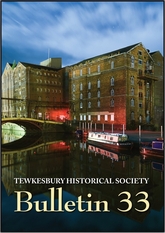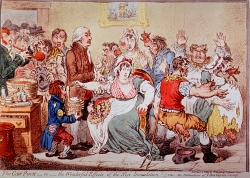Vaccination in Victorian Tewkesbury
The first compulsory Vaccination Act, which was passed in 1853, did not generate the level of prosecutions or debate as the more stringent Act of 1867. The first prosecution in Tewkesbury under the Act of 1867 was in 1871. The defence used by Mr. Clifford was that, of his five children, two had been vaccinated and had “been in a dreadful state” as a direct result of it; this argument of adverse effects was to be repeated by the majority of the anti-vaccinists. Mr. Clifford was fined one shilling [5p] plus expenses for failing to vaccinate, though objections on conscientious grounds such as this were eventually to become the turning point in the whole debate some twenty-seven years later.
The title of this paper – Irresponsible and Self-seeking Faddists – has been taken from an extensive list of invectives directed at the ‘anti-vaccinists’ and is taken from Joseph Swan’s The Vaccination Problem, of 1936. This title illustrates nicely the level of feeling which had developed towards the end of the nineteenth century as the debate became more vehement.
Clearly the level of feeling, both in Tewkesbury itself and nationally, was not universally accepting of the ideas of vaccination. At the bi-weekly meeting of the Board of Guardians for Tewkesbury Union on 13 January 1892 it was proposed by the chairman that in future, “owing to the strong opposition of many people in the district”, prosecutions would be suspended pending the report of the Royal Commission.1 It is noted in the Minute Book on 13 January that the Guardians “believe that vaccination is the best prevention of small pox” though this apparently united opinion was set to change radically over the ensuing years of the debate.
The practice was deemed unsavoury, dangerous and downright foolish by many sceptical members of the public. This is a great illustration of the paranoia and fear exhibited by certain members of society, in this case from the publications of the anti-vaccine society – and this fear and distrust of the practice of vaccination was still being aimed at Edward Jenner during the small pox epidemic which struck Gloucester in 1895. On Saturday 25 January Dr. Walter Hadwen (Gold Medallist in Medicine and Surgery) delivered a sensational speech condemning vaccination.2 There was “a large and enthusiastic” meeting of citizens gathered in the Northgate assembly rooms to hear his “denouncing vaccination as a superstition and a fraud”. So popular was the event that many failed to gain admittance. The bulk of his speech was directed firmly at Jenner and his practices, strongly aimed to debunk his theories and brand him a “superstitious” fool whose ideas were outmoded and circumstantial in their so called affirmative cases.3 Jenner was definitely cast by Hadwen as a quack whose practices “belonged to the good old times when George III was King – (laughter) – when medical examinations were not compulsory”.
Much of Hadwen’s speech is concerned with decrying vaccination as “superstition” and affirming the belief of the causes of small pox as being dirt. Hadwen describes small pox “as a filth disease”, which reminds one of the parallels drawn between dirt and the plague during the Tudor period. Surely Hadwen is referring here to the unsanitary conditions of population centres, seeing the dirt itself as the harbinger of disease? He does not acknowledge the effect that large numbers of people living close together will have on the spreading of highly ‘contagious disease’.4 The ill effects of confining people closely was shown to be detrimental where, in the isolation hospital itself, the death rate was seen to be the highest.5 In following this line of argument, coupled with the attack on Jenner’s methods, Hadwen himself here appears to have become a victim of the very "gigantic superstition” that he attributes to Jenner. Despite the limitations of his argument, Hadwen had found the ideal platform for his opinions: in the principal city of Jenner’s Gloucestershire Hadwen found and encouraged a hotbed of hostility to vaccination at the very time of a serious epidemic.
The epidemic of Gloucester had a strong bearing on the situation in Tewkesbury with regard to the issue of vaccination, and it was in late March at a meeting of the Board of Guardians that the resolution passed in 1892 suspending compulsory vaccination should be rescinded.[6]The proposition to re-introduce compulsory vaccination was carried on 25 March 1896 but a division in the ranks was clearly evident amongst the Guardians; the result after votes had been cast was fifteen for the proposition and fourteen against. Mrs. McIlquham of the Board of Guardians questioned the rescinding of the resolution of 1892.[7] Mrs. McIlquham was, at this early stage of the debate, the most outspoken against compulsory vaccination. As she saw it, “if their decision, as a Board in 1892 was right, then certainly they were wrong now”.[8] She wished to establish which course was to be taken; would the lines of the interim report be followed or would the lines of the Vaccination Acts and the “atrocious tyranny” that they implied be the chosen course? Though there were others amongst the Guardians who supported Mrs. McIlquham’s view, they were far less bold in their statements at this stage. Mr. Mayall, a believer in vaccination, felt that a “middle course” was the correct way to proceed and seconded Mr. Moore’s amendment to the proposition. They felt that a house-to-house visitation offering free vaccination to those who wished to take advantage of the treatment would be a more successful course of action. Mr. Gardner raised an interesting point against the idea of compulsion. He failed to see ‘compulsory’ as the correct term as by the simple paying of the fine the parent could walk free. The point was further expanded by Mr. Howell who rightly stated that, “This would inflict a punishment on the poor while the rich would not feel it”.[9] The reintroduction of the compulsory practice of vaccination had effectively divided the Guardians.
It was clear from the beginning of this new chapter in the vaccination debate that things were to run far from smoothly both in respect of the vaccinators and the vaccinees. Following the issuing of approximately 700 notices advertising the hours for vaccination at the residence of Dr. Allard by the clerk to the Board of Guardians, not one person attended. A complaint was also lodged by Mr. Fowler, one of the Guardians in favour of compulsion, that Dr. Allard failed to attend the Tirley vaccination station at the appointed hour on two consecutive occasions. The clerk was instructed to request the attendance of Dr. Allard at the next meeting of the Guardians in order that he should explain his absence.[11] It seems clear that the position of Vaccination Officer was not wholly popular with those who held the role. Though the minute book contains no reasons, one cannot help but wonder why, after less than three months following the resolution for compulsion, Mr. Badham, the Vaccination Officer, should tender his resignation.[12] The case of Mr. Badham was the first in what we shall see as a ‘rapid turnover’ of vaccination officers in this short period from 1896 up until the first year of the twentieth century.
It was proposed that the replacement for Mr. Badham should be one Mr. Archibald Rix and that the level of remuneration awarded to him be set at 1/- for each successful case of primary vaccination. An amendment was proposed by Messrs. Horton and Mayall, both being anti-compulsory vaccination, that the level of remuneration should be a fixed sum, namely £20 per annum.[13] This ‘piecework principle’ was certainly felt to be particularly harsh as now not only was it compulsory for the parent to accept vaccination, but the Vaccination Officer had a vested interest in executing his duty and this was surely the motivation behind Horton and Mayall’s amendment.[14] By September of 1896 Mr. Rix had been approved by the Local Government Board as Vaccination Officer for the Tewkesbury district at the rate of 1/- for each successful case registered by him. The idea of ‘Payment by Results’ was now approved officially – and was set to cause further animosity amongst the anti-vaccinists.

On 16 December Mr. Rix presented to the Guardians a list of the defaulters under the Vaccination Act of 1867 which comprised 74 individuals.[15] It is very interesting to note the spatial grouping shown by the defaulters, as it can be seen that the list shows definite trends or ‘pockets of resistance’.[16] Also demonstrated by the list of defaulters is an occupational trend which shows that the labouring class was the stronghold of resistance to vaccination.
This could be read in two different ways: the labouring class, the poorest, would be those worst affected and so were strongest in their opinion; or they were the more ill-informed sector of the population and may be prone to paranoia or unsubstantiated fears. Mrs. McIiquham described these people as “the majority of whom were in the lower walks of life, and that fact is constantly being thrown at them”.[17]
On 16 December what is perhaps the key event relating to the whole issue of compulsion occurred. It was at a meeting of the Guardians on this day that the resolution to prosecute was carried. An amendment was proposed by Mr. Gardner and Mr. Howell that the Board wait for the promised legislation which would result from the recent report of the Royal Commission. The amendment, of course, failed and it was decided that parents were to be prosecuted under the Acts for “failing to have their child vaccinated”.
A second amendment was proposed that parents should be given the opportunity to attend the Board and state objections but this amendment also failed by a majority of thirteen to seven.[18] This fact of refusal to acknowledge the conscientious objection was to become pivotal to the vaccination question. The decision to refuse to hear objections was responded to by Mr. C. E. Smith and Mr. C. Davis of the Non-Compulsory Vaccination Society who addressed a letter to the Guardians expressing their outrage at the decision. This was deemed especially unfair in light of the ‘conscience clause’ recommended by the Royal Commission.
The first tangible victory for the anti-vaccinists came in the form of their victory before the magistrates at the end of January 1897. Of the original list of 74 defaulters, eleven were summoned to the Town Hall before the magistrates. From the newspaper report of this event, we can establish clearly that the Tewkesbury Register favoured the position of the anti-vaccinists. Not only is the report very lengthy, but the language and style of writing is more emotive and less sober than the norm. The opening paragraph illustrates this well and states that: “To anyone passing the Town Hall this (Friday) morning, about 11 am, it was obvious that something far more interesting than the usual ‘drunk and disorderly’ or ‘obscene language’ was to occupy the attention of the Borough Magistrates;”[19]
In December of 1897 a string of summonses ensued to which all of the defendants claimed previous ill effects to other children vaccinated; the majority of cases resulted in the fining of the defendants the sum of 5/- and 9/- in costs.[22]
The case against compulsion was now establishing itself more strongly; at a meeting of Guardians on 15 December it was resolved that in future the Vaccination Officer was to submit a report for each individual case and take the instructions of the Guardians thereon.[23] The Tewkesbury Register reporting on the matter stressed the sensible approach of allowing the Guardians to judge each case and highlights the fact that, as a group, they are far better suited to judge each case. The present situation was seen as unjust by Mr. Gardner, the prosecutions being made “at the sweet will of the Vaccination Officer”. Amusingly, Mr. Gardner reminded the Board that “exactly twelve months ago, when they adopted a resolution to prosecute, that very night there was an earthquake” (laughter).[24] Mrs. McIlquham praised the proposition as it gave them the opportunity of rescinding an order, with which she and “her own side of the Union” had never agreed. She also pointed out that Tewkesbury chose to prosecute where the more influential unions, Bristol, Barton Regis and even Gloucester, did not.
Clearly, the ‘conscience clause’ coupled with the ambivalent views of the Board did not bode well for the goals of the vaccinists. One result, arguably, of the Board’s decision not to pursue the matter of non-vaccinists through the court, was of course the now vulnerable position of the Vaccination Officer who attempted to work under these conditions. Gone were the days of arbitrary prosecution; now the Vaccination Officer was answerable to the Board directly. It is unsurprising that Mr. Rix applied to the Guardians for a fixed rate of remuneration at this juncture.26
The final blow to the lot of the vaccinists came in the form of an election whereby the Anti-Compulsory Vaccination Society won a significant victory in the elections of the Guardians.27
Less than twelve months later, Mr. Rix decided to resign. It is most probable that the practice of vaccination was no longer economic. Towards the end of the century, a spate of potential Vaccination Officers came and went; on 29 March it was proposed that one N. G. A. Mann should be appointed as Vaccination Officer.28 Less than six months later he had also tendered his resignation. This was an unfortunate period for the Vaccination Officer; the next successful applicant was a Mr. Walker, the late manager of Scales & Co.’s Boot Shop. He arrived with no testimonials and following five months as the Vaccination Officer, Mr. Walker was questioned upon his suitability for the role. At a meeting of the Board on 28 February 1900 it transpired that Mr. Walker was completely negligent of all of his duties as Vaccination Officer, had not performed any of his duties and had not even read the Act of 1898!
On 1 August he gave his notice and it was almost three months later that Mr. B. Kendall was approved as Vaccination Officer. Less than one month later, Mr. Kendall had also given his, now familiar, month’s notice, leaving the position of Vaccination Officer open for any who considered that ‘payment by results’ coupled with the ‘conscience clause’ could be made to pay for them. Indeed, vaccination in Tewkesbury had become a most unpopular practice.29



Comments